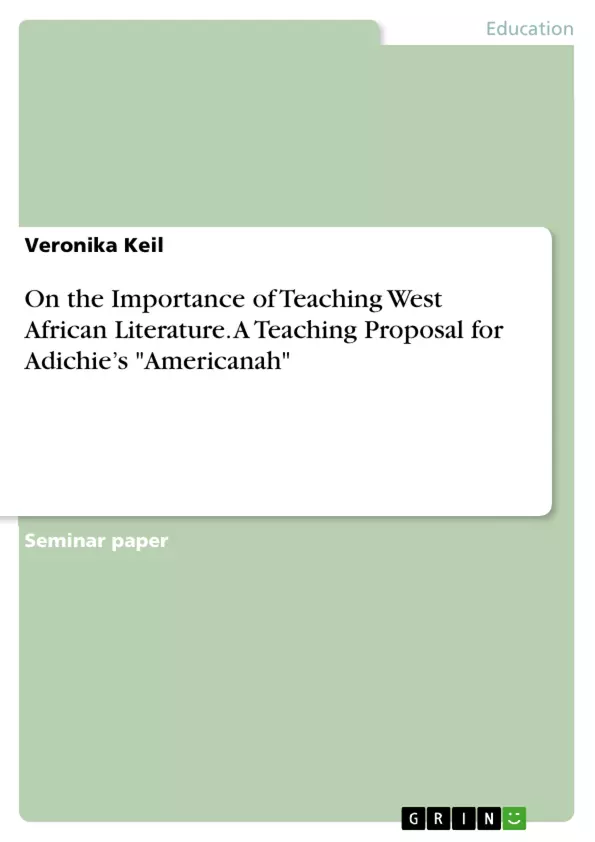Before this paper will aim to give relevant reasons for teaching West African Literature, it will examine the question of why we even teach literature at all in the language classroom.
As the restricted frame of this paper will not allow to cover West African Literature in general, especially in means of all the various countries that are included in this term, it will only focus on the novel "Americanah" which is a literary work by the Nigerian writer Chimamanda Ngozi Adichie. First, it will shed a light on teaching Literature in general an explain why there is a much-needed step towards New Literatures such as the described novel is. Then, it will provide a short summary of the plot and themes in Americanah, followed by probably the most important part which will introduce a teaching proposal for the novel.
As it is with every material a teacher chooses for a class, he or she has to ask himself what the students can learn from it, how it is of bigger advantage and whether it is more beneficial than rather choosing another material or method. In this case, it is the quite convincing power of literature to be an authentic source that significantly helps improving the process of language learning.
Table of Contents
- Introduction
- The Need to Teach West African Literature
- Reasons for Teaching Literature
- Teaching New Literatures
- The African Diaspora
- Raising Awareness
- Intercultural Awareness and Competences
- Minimizing Generalized Thinking, Stereotypes, Prejudices and Racism
- Conclusion
- Adichie's Americanah: A Summary
- Themes and Motifs in Americanah
- Race and Racism
- Identity
- Culture
- A Teaching Proposal for Adichie's Americanah
- Teaching Key Passages from the Novel
- Basic Information about the Teaching Unit
- The Teaching Unit- An Overview
- Detailed Description of One Lesson
- Didactic- Methodical Rationale
- Conclusion
Objectives and Key Themes
This paper aims to examine the potential of and reasons for teaching West African literature in the EFL classroom. It focuses on the novel Americanah by Chimamanda Ngozi Adichie and explores the need to diversify literary approaches in the classroom to include more contemporary works from various countries.
- Importance of teaching literature in language learning
- Significance of New Literatures, particularly West African Literature
- Challenges of colonial history and the African diaspora in shaping West African literature
- Promoting intercultural awareness and combating stereotypes and prejudices
- Using Americanah as a case study to illustrate the benefits of teaching diverse literary perspectives
Chapter Summaries
The introduction highlights the growing role of literary texts in classrooms and challenges the limited focus on classic works from a restricted canon. It argues for the need to include more contemporary works from diverse cultures to better prepare students for a globalized world.
Chapter 2 delves into the reasons for teaching literature in language learning, emphasizing its ability to improve language skills, provide authentic cultural insights, and encourage critical thinking. It also introduces the concept of New Literatures, particularly West African Literature, which emerged from the legacy of colonialism and the African diaspora.
Chapter 3 provides a summary of Adichie's Americanah, highlighting key plot points and themes. Chapter 4 further explores major themes in the novel, including race and racism, identity, and culture, providing a deeper understanding of the issues addressed in the work.
Chapter 5 presents a teaching proposal for Americanah, outlining key passages for classroom discussion, basic information about the teaching unit, and a detailed description of one lesson. It also addresses the didactic-methodical rationale behind this proposed approach to teaching West African literature.
Keywords
West African Literature, New Literatures, Americanah, Chimamanda Ngozi Adichie, EFL classroom, Intercultural Awareness, Stereotypes, Prejudice, Racism, Identity, Culture, Post-colonialism, African Diaspora.
Frequently Asked Questions
Why should West African literature be taught in EFL classrooms?
It provides authentic cultural insights, promotes intercultural awareness, and helps to minimize stereotypes and prejudices by presenting diverse global perspectives.
What is the central plot of Adichie's "Americanah"?
The novel follows the story of Ifemelu, a young Nigerian woman who migrates to the United States, and her experiences with race, identity, and the African diaspora before eventually returning to Nigeria.
How does the novel address the theme of "Race and Racism"?
It explores how race is perceived differently in Nigeria versus the UK and USA, and highlights the specific challenges faced by "Non-American Blacks."
What are "New Literatures"?
New Literatures refers to contemporary literary works emerging from post-colonial contexts, which challenge the traditional Western literary canon.
What is the benefit of using literature as an authentic source for language learning?
Literature improves language skills by exposing students to complex vocabulary and grammar in a meaningful context while simultaneously encouraging critical thinking.
- Quote paper
- Veronika Keil (Author), 2017, On the Importance of Teaching West African Literature. A Teaching Proposal for Adichie’s "Americanah", Munich, GRIN Verlag, https://www.grin.com/document/430773



